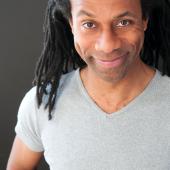Our Call Time is Now

As much as I tried, my words and thoughts these last few weeks turned to issues rather than shows. Tension within camps is fueled by growing awareness and unprecedented access to a voice. Politics, comedy, theater, every day life: it is there and as Sam Cooke sang marvelously: a change is gonna come. It needs to. So in being true to where I find myself, my guest appearance here in News and Notes takes a more editorial bent, hopefully not overturning the house in Derek’s absence.
I am always frustrated by the suggestion that performers need to just perform and be quiet; don’t get involved. Somehow the logic is that because we don’t have a “real job” or “live in the real world”, our voices and actions are not valid. This belies a history rich with involvement by the famous and not-so famous. We go home like anyone who is privileged with a dwelling. We have to worry about paying the bills just like anyone who is privileged with a job and utilities. And hopefully, we are aware of the struggles of others even as we have our own. No matter how much we dance on stage and maybe even steer away from anything remotely political, the show ends, and we still navigate society. It is difficult to give people an escape without some familiarity with what they seek escape from.
The more famous folks have a platform that can reach millions. Even those of us that are not famous still have a platform others don't have, given to us by our choice to be performers. Some sacrifice energy. Others ultimately sacrifice career, whether by focus or as a result of risk. Like it or not, we are all connected to this tradition: performers, educators, creators - all. And so we find ourselves one more month to go in a year many of us feared would see us in worse shape than we miraculously seem to be in at the moment. Possible reasons we’re still here and not in one of any number of post-apocalyptic scenarios are:
1) Even horrific declines tend to take time.
2) Oddly enough, checks and balances still work sometimes.
3) We as a society are learning and exercising a rising awareness of ways to take care of each other.
I’m biased; number 3 is my personal favorite and fills me with a stubborn hope. An essential part of taking care of each other is taking care of ourselves. With that in mind, there are only a couple weeks left in the enrollment period for health insurance. If you haven’t taken care of that, please get on it. You can find some information on healthcare.gov, on mnsure.org (where you can compare and find other tools to help), or through Springboard For The Arts’s health and wellness overview page. Springboard has the bonus of being certified MNSure navigators to make things a bit easier.
While it would nice for more things to be easier, that just isn’t the case. It’s easy to be cynical and to proclaim that nothing is good anymore, that nothing does any good, and that we can’t have nice things.
We can have nice things. Even more essential to realize is that we can be those nice things for ourselves, for our audiences, and our communities. In order to do that, we need to be able to learn when we screw up and how we can do better. It means something we as performers should be familiar with and need to embrace: rehearsing, group and individual work, and taking notes.
We could all stand to be better about taking notes. We benefit from reviewing the material, even though it’s difficult to watch ourselves. Sometimes taking feedback and criticism can sting. We could be better about listening, making space, meeting our audiences and our colleagues where they are in order to get where we all want to be. This looks different, depending on who you or your company are. For larger theaters, it may be trying to engage a younger adult audience that doesn't have the same financial resources or artistic tastes of older audiences who have been their largest audience and contributors. For smaller companies, it may be an ongoing mission of taking productions directly to the communities they seek to serve. Of course we want everyone to come to the table and be welcome, but we must also realize when we are repeatedly demanding people to come to a table of our choosing, under conditions we are setting. We have to meet people where they are. We cannot always expect them to come to us, unless what we really want is to die slowly.
We have to look at old approaches and adjust them or set them aside. We have to be able to listen to people inside our own ranks and learn about ways we have been under serving or ignoring specific, valid concerns for segments of our groups. With so many ways our implicit biases can mold our choices, there is a lot to reflect on and address inside our companies, our circles, and ourselves.
How are we reaching out to other audiences? How are we building, bridging, and strengthening true unity and breadth in our own circles and overlaps? When we disengage from these opportunities to learn and change we are treating our audience only as a target. When we shy away from challenges to our status quo, we may also be supporting some degree of erasure of our peers. This does not look like who we say we want to be and it is far from the goal of engaging people and creating with and for people.
Now more than ever, we need to look ourselves in the eye and keep having a Come to Jesus talk. We need to be honest with ourselves. Do we really want to positively affect people? Do we really want to enrich our collective or individual cultures? Do we really want to be better and to do better? Or do we just want to get in front of people and masturbate?




